Top 20 Open Source Ecommerce Platforms For Your Business
Nowadays, the number of people shopping online is increasing significantly. So many businesses are trying to move from traditional stores to eCommerce.
However, limited budgets and the shortage of coding knowledge become challenges for many merchants. So a lot of open source eCommerce platforms are great solutions. Open source means that you can completely utilize the source code by modifying based on your needs. There are 3 mains benefits of open source platforms including lower cost, no lockdown vendor and customization.
So open source platforms have become attractive to many businesses. If you are finding an open source platform, read our blog to know the top 20 perfect and free platforms for your business.
1. Magento-open source eCommerce
With more than 250 000 merchants all over the world, Magento becomes one of the most popular platforms in the past few years. Magento offers both free community edition and paid plans for the enterprise edition.
There are some main features of Magento such as Adobe Commerce Application, B2B functionality, Core Application Support, Business Intelligence Pro, Managed Cloud Service and so on.
Advantages
- Firstly, it is free for you to start
- Secondly, it is a rich-feature platform. It supports you with multiple stores, locations, languages, currencies and pricing options.
- Thirdly, you can use extensions from a large community of developers.
- At last, you can utilize this platform to scale up your business through a big number of users.

Disadvantages
- Firstly, it seems quite expensive for small merchants because you need to install extensions and themes.
- Secondly, it requires you to understand a little about coding.
- Thirdly, you may find difficulties with its installation.
- At last, this platform has many features so you need to optimize its website to improve speed loading.
2. WooCommerce-open source eCommerce
According to Statista, WooCommerce accounts for 23.43% market share of leading e-commerce software platforms worldwide. This number proves the popularity of this platform among users.
WooCommerce was built to support WordPress users. It allows you to turn a WordPress website into an eCommerce store. Besides, WooCommerce is famous for CMS software.

Advantages
- Firstly, it is a free plugin. And it is great for those who use WordPress, especially.
- Secondly, it provides high customization. It supports you with multiple themes and extensions.
- Thirdly, you can integrate with many payment gateways.
- Also, this platform has a large community of users and developers.
- At last, it is a mobile-friendly platform.
Disadvantages
- Firstly, you need to update and maintain frequently.
- Secondly, you may pay any extra fees for domains, extensions and themes.
- Thirdly, it requires you some knowledge of WordPress.
- At last, it does not include legal texts such as general terms and conditions, data protection declarations, …
3. Opencart – open source eCommerce
OpenCart is an open-source platform using PHP programming language. So it allows you to customize easily. Compared to Magento, OpenCart is lighter and faster. However, it has limitations about the number of products and users. In general, OpenCart will suit for the startup and small businesses.

Advantages
- Firstly, you can download OpenCart for free.
- Secondly, it supports multiple stores and more than 50 payment gateway.
- Thirdly, it provides you with reporting tools and customer support.
- At last, it is a user-friendly platform.
Disadvantages
- Firstly, you may face difficulty installing this platform.
- Secondly, the speed loading seems slow.
- Thirdly, it’s a very buggy platform.
- At last, it needs to improve security.
4. PrestaShop – open source eCommerce
PrestaShop provides an eCommerce platform for around 260,000 stores worldwide. It allows store owners to manage orders, products, customers and so on. With more than 5000 modules, graphic themes and services, PrestaShop has become attractive to many businesses.
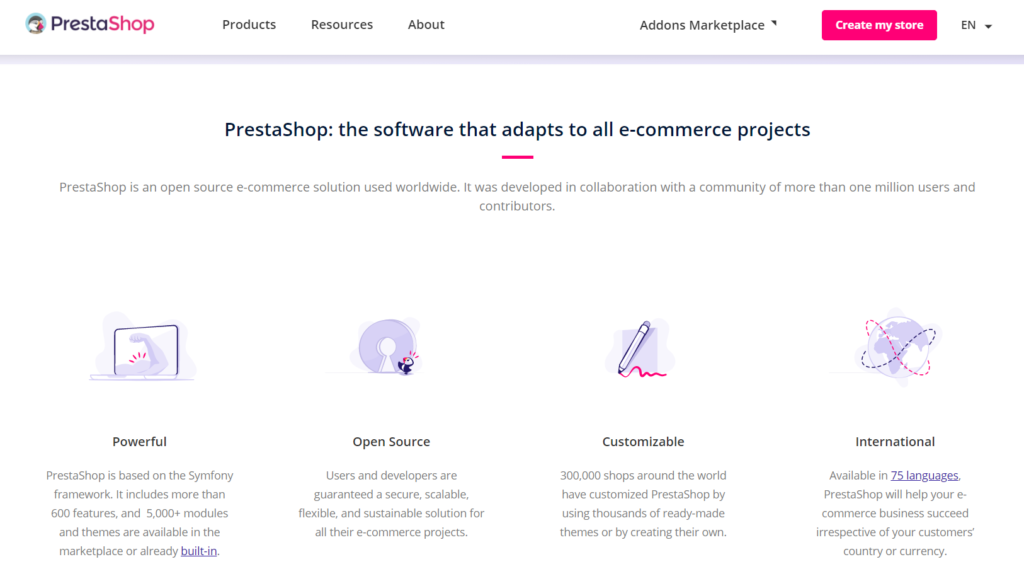
Advantages
- Firstly, it is easy for you to use the Administration panel.
- Secondly, the inbuilt function of PrestaShop is very rich.
- Thirdly, it offers you many useful tools such as customer notifications, order history, data import or export, …).
- At last, SEO optimization is great.
Disadvantages
- Firstly, it is difficult for you to scale up.
- Secondly, you will have to pay extra fees for the module instead of extensions.
- Thirdly, you need to read many tutorials to start a business in PrestaShop.
- At last, different plugins may not work well with each other
5. Odoo – open source eCommerce
Anyone with no coding expertise can create a stunning website with Odoo’s highly creative, user-friendly Website Builder. Odoo’s basic features and easy-to-navigate design make it simple for users to create and administer a website quickly and efficiently. Odoo has both a free version and paid plan.
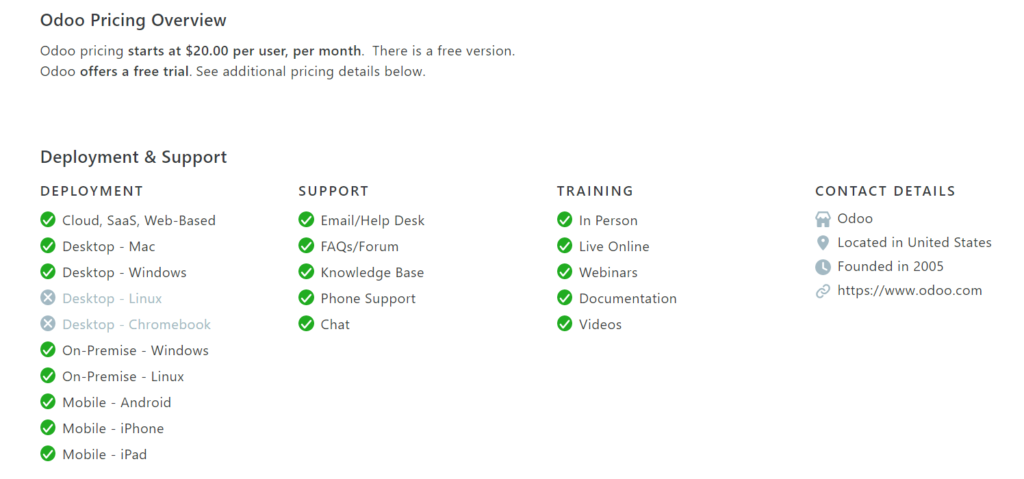
Advantages
- Firstly, you can use it easily.
- Secondly, CRM and accounting functions are really good.
- Thirdly, it provides seamless integration between modules.
- At last, the community support is supportive.
Disadvantages
- Firstly, the pricing options seem complicated.
- Secondly, in case you use the free version, it may be hard to maintain.
- Thirdly, it has limited documentation on support
- At last, not all localizations are included in the core.
6. OsCommerce – open source eCommerce
OsCommerce is an open-source platform with over 300 000 store owners, developers and service providers. It is suitable for people who want to start a trial in eCommerce Businesses or small merchants.
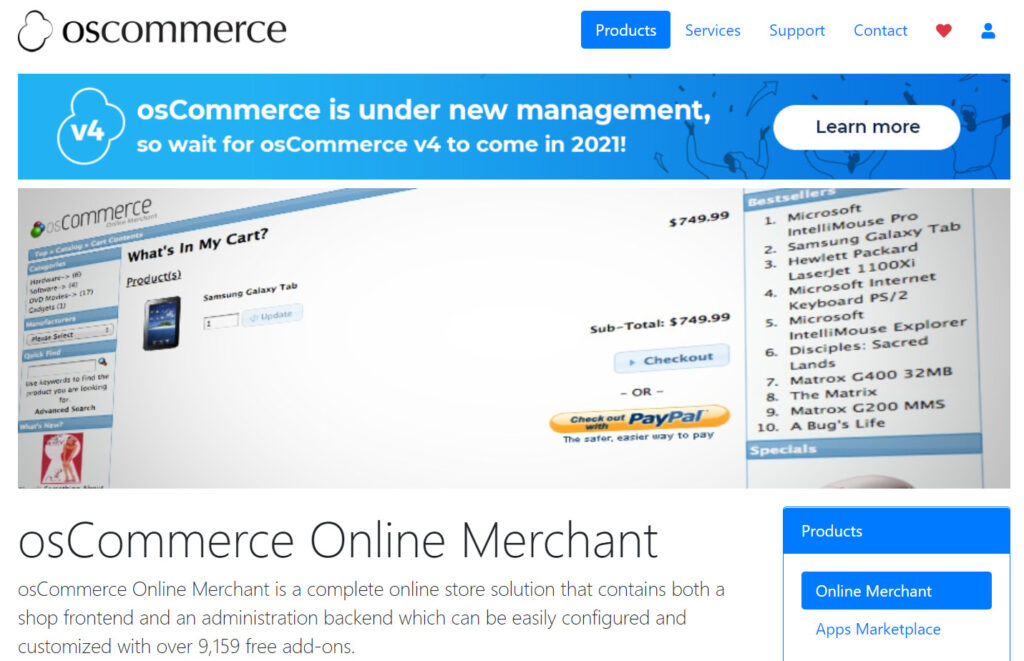
Advantages
- Firstly, it is easy to use and run your business.
- Secondly, there are many integrations to strengthen your store.
- Thirdly, it has a strong community of users.
- At last, it is free to download.
Disadvantages
- Firstly, it is difficult to scale up.
- Secondly, the design seems to be out of date.
- Thirdly, reports have many errors.
- At last, it requires you to know little about coding.
7. Wix Ecommerce- open source eCommerce
Another Open Source eCommerce is Wix eCommerce. The free plan of Wix eCommerce is particularly ideal for beginners who need powerful tools for building and hosting a standard business website. You can also use many other free applications from the Wix App Market to form a dynamic marketing framework. However, unfortunately, Wix will bombard your free website with ads.

Advantages
- Firstly, you can use the drag and drop tool to customize your website.
- Secondly, it offers you special themes and templates.
- Thirdly, you can buy more apps in Wix App Market to improve your store.
- At last, when you sell online from your eCommerce website, Wix does not deduct any fees.
Disadvantages
- Firstly, you need to use paid plan to own the full features of an online store.
- Secondly, if you use the free plan, you will face a lot of advertisements.
- Thirdly, Wix does not support you with the underlying code.
- At last, you can stop editing the website theme during the editing process.
8. nopCommerce- open source eCommerce
The platform has a large number of capabilities that allow you to develop projects and integrations of any complexity. Furthermore, it is the most well-known Microsoft foundation platform that has remained free since its inception in 2008. It now powers over 60.000 internet stores.
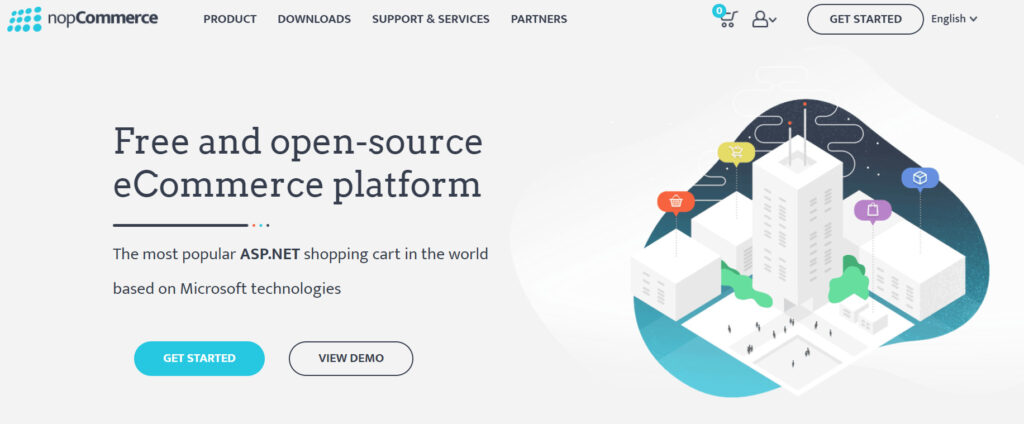
Advantages
- Firstly, it has a user-friendly interface and administration.
- Secondly, well-structured code helps in extending and customizing the software.
- Thirdly, nopCommerce can be downloaded, installed and used free of charge.
- At last, the program had been translated into 30 languages.
Disadvantages
- Firstly, it has limited payment integrations.
- Secondly, it provides limited free templates.
- Thirdly, it is the best for a Windows server infrastructure environment. This is not PHP or JAVA. This is all Microsoft and .Net.
- At last, it lacks reporting.
9. X-Cart – open source eCommerce
X-cart is an eCommerce platform for both small and huge businesses. It offers you many features and integrations to develop your store. Besides the platform, it also provides you with hosting, migration, GDPR, Seo Audit and so on. Nowadays, X-cart has served more than 35,000 online stores and has grown quickly. To use all the functions of a premium plan, you have to pay around $500.

Advantages
- Firstly, it provides you with many stunning design templates.
- Secondly, its search engine is intelligent.
- Thirdly, Cart 4 has maintained perfectly in stock and out of stock records.
- At last, it is secure and complies with PCI.
Disadvantages
- Firstly, the start skin should be much cleaner. You may find thousands of excess lines of code.
- Secondly, it is hard to create new plugins and you need to manually change each file.
- Thirdly, the bookable module in the business license version also has limited functionalities.
- At last, updates have a tendency of breaking even vanilla installs of X-Cart.
10. Zen Cart – open source eCommerce
Zen Cart originates from the osCommerce but it becomes individual since 2003. It is an open-source eCommerce using PHP and MySQL. You can install this software for free but you need to pay more to use add-ons features.

Advantages
- Firstly, it is free to download.
- Secondly, Zen Cart provides you with high security.
- Thirdly, the support forum is responsive.
- At last, it provides you with a good product management system by offering several product options.
Disadvantages
- Firstly, this platform does not provide any customer support service.
- Secondly, the site appearance of Zen Cart is not eye-catching.
- Thirdly, you need to wait for a long time to upgrade software.
- At last, these extensions that you bought may not work well with others.
11. Square Online – open source eCommerce
Square is a well-known eCommerce platform for its POS system. It offers you a budget-friendly online store builder. Through the Square system, you can build your own store with full functions. With its free plan, you can own hosting, SSL certificate and many functions.

Advantages
- Firstly, the designed templates work well on both desktop and mobile devices.
- Secondly, it is easy to use and includes a great support team.
- Thirdly, you can manually edit separate photos and add multiple ones.
- At last, it allows many payment methods without commission
Disadvantages
Firstly, it is not suitable for big companies which have many transactions.
Secondly, it costs high fees for large businesses.
Thirdly, it is the hardest non-eCommerce-specific builder to use.
At last, it has some account stability issues.
12. Buy Now Plus – open source eCommerce
BuyNow Plus isn’t a complete e-commerce solution. Instead, you may use this list of the top free open source eCommerce platforms to create “buy now” buttons that you can embed on any website. To utilize BuyNow Plus, you’ll need to create a free Stripe account.

Advantages
- Firstly, at only 2% of each transaction, the transaction charge is quite cheap. Stripe, on the other hand, adds its own transaction fees on top of that.
- Secondly, you may use BuyNow Plus to handle recurring credit card payments without requiring your consumers to register an account.
- Thirdly, you can install the buy now button flexibly. You can put it through social media, email or your store.
- At last, you can sell different products.
Disadvantages
- Firstly, it does not support you with tracking inventory or creating a website.
- Secondly, you might get a similar result by integrating Stripe with your online store. you wouldn’t have to pay BuyNow Plus’ transaction charge this way.
- At last, you’ll need your own SSL certificate, although it’s easy to obtain one for free.
13. Ecwid – open source eCommerce
Ecwid stands for “ecommerce widgets” in English. And, as the name implies, this is not a comprehensive ecommerce platform. Instead, it’s a shopping cart that you can add to any website to turn it into a fully functional online store. However, as you may have suspected, this will require the use of a few lines of code.

Advantages
- Firstly, it is simple and quick to convert your existing website to an online store.
- Secondly, you can sell products to customers through multiple stores.
- Thirdly, you can add capabilities to your website quickly without coding knowledge.
- At last, you don’t have to pay the transaction fees through Ecwid.
Disadvantages
- Firstly, the design options are limited.
- Secondly, its sales tool is so small so it is difficult for you to grow fast.
- Thirdly, it does not provide advanced ecommerce features.
- At last, in case you use the free plan, it won’t support you with phone and chat. Besides, you can’t use the app market.
14. Jimdo – open source eCommerce
Jimdo is a hosted solution, which means it operates in a browser and doesn’t require any software to be installed on your computer or any hosting to be purchased. The concept is that Jimdo would supply all of the essential pieces of your website, including a domain, template, and hosting. All you have to do now is add the material.
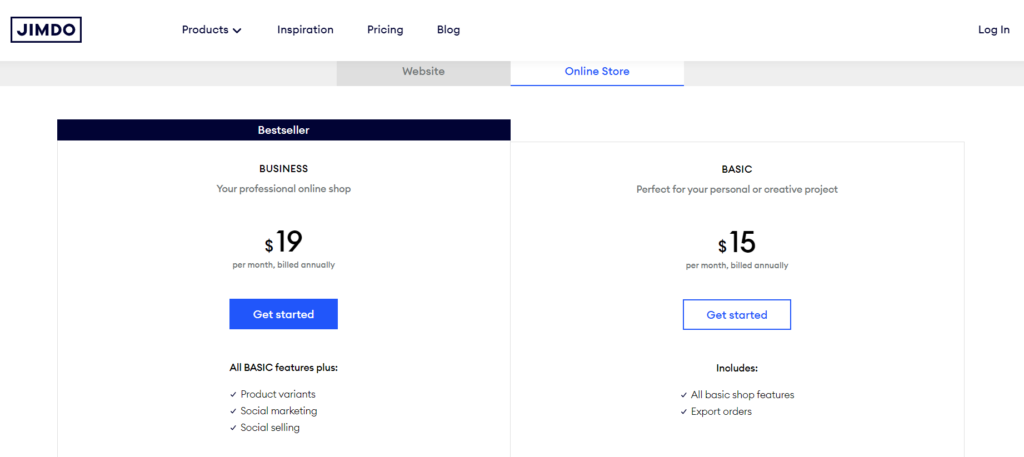
Advantages
- Firstly, it is cheap to start selling online.
- Secondly, it is GPDR compliant.
- Thirdly, on Jimdo, the Dolphin AI website builder produces a perfect layout based on your choices and site information.
- Next, Jimdo has built-in SEO tools to help you rank higher on Google.
- At last, it does not charge you per orders.
Disadvantages
- Firstly, it only supports you through emails.
- Secondly, Jimdo only provides the basic features for eCommerce so it is difficult to scale up.
- Thirdly, there is a limit of one contributor per site.
- At last, the templates are not various.
15. Weebly – open source eCommerce
Weebly is a website builder with a drag-and-drop interface and over 40 mobile-friendly designs. A blog, image galleries, and an online store are all included (powered by parent company Square). Weebly Professional, which costs $12 a month and allows you to use your own domain name, is the lowest ad-free option.

Advantages
- Firstly, it is constantly improving and adding new features.
- Secondly, it meets standards for security and cookies.
- Thirdly, Weebly has an auto-save function so your work doesn’t get lost.
- At last, it has a strong support community to solve problems and find ideas.
Disadvantages
- Firstly, although detailed HTML modification is feasible, it may instil optimism in users, particularly those without technical knowledge.
- Secondly, the layout and format can be a bit cluttered.
- Thirdly, you are locked into a very specific platform.
- At last, the plug-ins are limited.
16. Bigcartel – open source eCommerce
Big Cartel is a free eCommerce platform that allows you to create an online store. BigCartel is ideal for small enterprises that aren’t aiming to expand up quickly since its simple sales capabilities make it suitable for selling individual pieces such as artworks rather than mass uploads.

Advantages
- Firstly, the layout of the online shop is simple to navigate and contains instructions that are easy to understand.
- Secondly, it’s very easy to use and does not require a lot of configuration or setup.
- Thirdly, it loads quick both on the consumer front end and also admin backend.
- At last, the pricing model does not contain a percentage of transactions.
Disadvantages
- Firstly, themes with simple designs and lack customization.
- Secondly, coding is required to go beyond the builder’s capabilities.
- Thirdly, it is not suitable for larger stores or stores that need advanced capabilities.
- At last, it does not have a search function
17. Joomla – open source eCommerce
Joomla is one of the world’s most widely used open-source content management systems. It is used to assist in the development of websites so that content may be maintained fast and simply. The objective is to provide advanced tools for the typical internet user to utilize in order to develop a design that satisfies particular requirements.

Advantages
- Firstly, it allows you to use blocks to create and visuall manage websites, as well as separate them into other categories, without coding knowledge.
- Secondly, it is suitable for beginners.
- Thirdly, it is intuitive.
- At last, it provides tools to make everything more manageable.
Disadvantages
- Firstly, the options in the dashboard are limited.
- Secondly, it is hard to build a complex website.
- Thirdly, you should pay additional fees for some extensions.
- At last, in terms of themes and robustness, it trails behind competing for CMS systems.
18. Spree Commerce – open source eCommerce
Spree Commerce is an eCommerce platform that coders will adore, but non-techies will find difficult to use. However, if you know how to code or can afford a developer who can, this platform will grow with you.
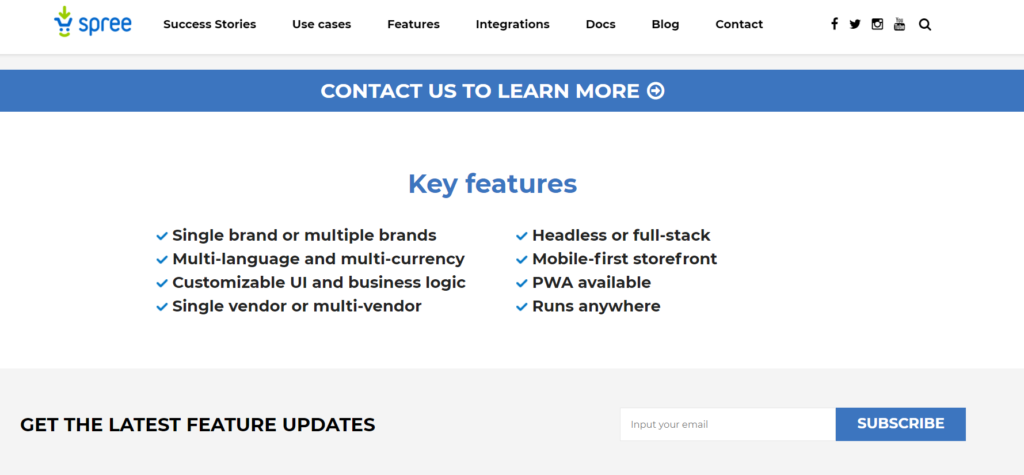
Advantages
- Firstly, it is free to download.
- Secondly, you can customize your store easily.
- Thirdly, it allows you to integrate with third-party integrations.
- At last, its SEO capability is good.
Disadvantages
- Firstly, you need to hire Ruby on Rails developers to work with this platform.
- Secondly, there are not many themes for you to select.
- Thirdly, you need a developer to customize popular functionality.
19. Drupal – open source eCommerce
Drupal is a flexible, scalable and feature-rich eCommerce platform for you to build an advanced website. It is now used in more than 200 countries and is accessible in 182 languages. Surprisingly, it is used by a large number of website design and development businesses throughout the world to create their best websites.
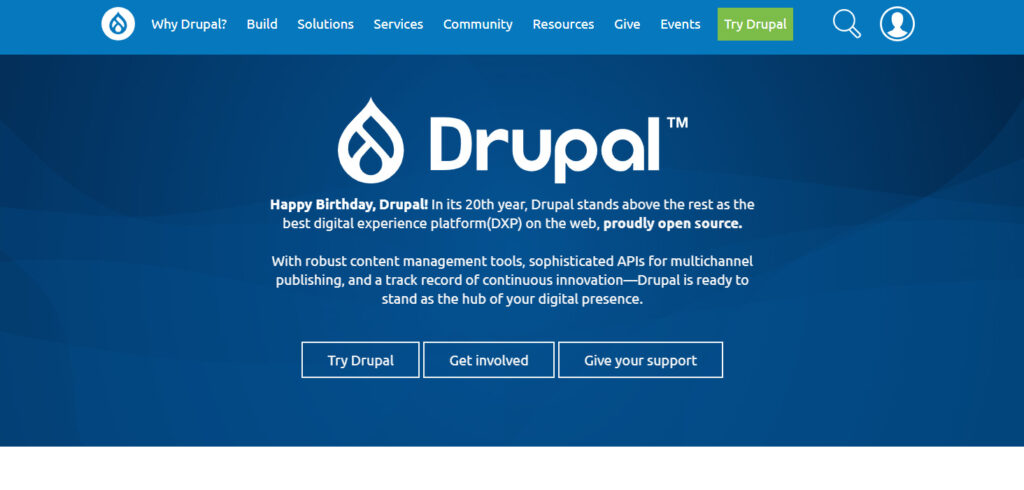
Advantages
- Firstly, Drupal provides you with systematic updates.
- Secondly, it has many mobile-friendly themes.
- Thirdly, it is suitable for people who are in the Drupal systems.
- At last, there is a strong community to support you.
Disadvantages
- Firstly, it is not a friendly interface.
- Secondly, it has limited modules.
- Thirdly, it is expensive.
- At last, its websites may quickly become resource hogs as they grow in size and complexity, with numerous components and changes.
20. WP eCommerce
Everything you want to sell online is included in the WP eCommerce Plugin! With an attractive online store and a secure shopping cart, you can turn visitors into customers. WP eCommerce is one of the most popular open-source solutions for company owners across the world, powering 36,186 shops.
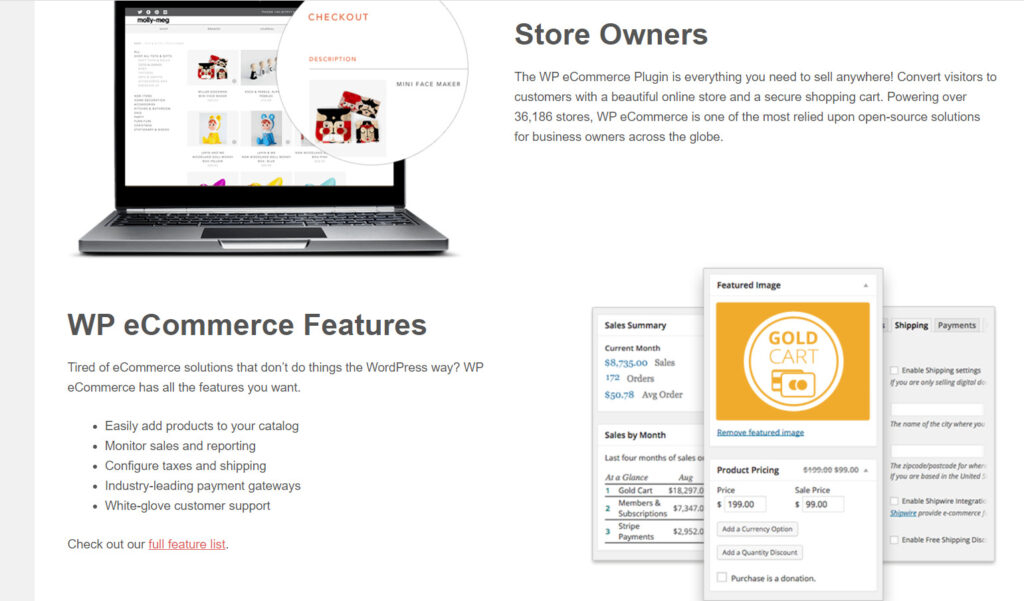
Advantages
- Firstly, it has strong community support.
- Secondly, the plugin supports lots of payment gateways, however, this platform will help you if you need to use one that isn’t listed.
- Thirdly, the backend is simple to use, and the frontend outputs are neat and contemporary.
- At last, you may simply change all of this using basic CSS and HTML.
Disadvantages
- Firstly, there are limited add-ons.
- Secondly, you may charge extra for premium support.
- Thirdly, there aren’t nearly as many WordPress themes available for WP eCommerce as there are for WooCommerce.
- At last, the plugin hasn’t really been updated in over a year, according to the WordPress site.
In conclusion, there are many free and open source platforms available for you. You should base on your needs and budgets to make decisions. Arrowthemes wishes you to have a successful business. Read more useful articles about eCommerce here!



